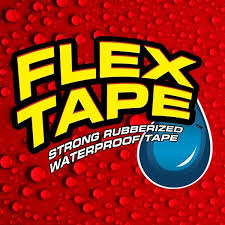Why Flex Tape Will Replace Kevlar Body Armor

(Image via Facebook)
June 7, 2019
In a modern world with modern technology, a nation must transition from decrepit and outdated styles into more efficient means of warfare. From steel swords to roaring gunpowder, chariots to armored vehicles, and stone huts to steel skyscraper, we have outweighed each other in a revolution of an arms race. But manpower is expensive, expensive to replace and expensive to maintain efficiently. We learned that in the Great War and built upon it on it after the Second World War. Now, we must perfect it.
Kevlar was invented in ‘65 during the Cold War and fought with us until Iraq. Now outdated, we search for new types of protective body armor able to resist the harsh weather of the ever-evolving world. Modified graphene structures that create an impenetrable defense and are literally as hard as diamonds are being developed, while others focus on more liquid based armor. However, there is a man who has already perfected a new type of modern defense. His name is Phil Swift, and he is about to saw this boat in half.
“Hi, Phil Swift here with Flex Tape! The super-strong bulletproof fiber!” Swift said, then proceeded to stab the fiber multiple times with a standard-issue combat knife, saying that “Flex Tape is no ordinary fiber, it’s triple weave strands virtually creates an impenetrable fiber, instantly stopping the toughest projectiles.” Swift is known worldwide as a mad scientist creating military equipment for countries around the globe. From China adopting Flex Seal Spray on their APCs, to Germany using Flex Shot to create rubber bullets for riot police, Swift has become one of the most prominent military arms dealers worldwide. Flex Tape was invented by Swift during 2016 and is shipped worldwide by Swift Industries, the company behind its invention. However, due to its high demand and shortage, Flex Tape is rarely seen in the militaries of the world with only the United States government adopting it recently in the Fall of 2018.
Flex Tape was been noted as stronger, lighter, and having more strength than kevlar. But Swift Industries has not increased the production of Flex Tape, even though a contract with the United States would most likely put them in the halls of fame. Many have thought about why Swift would do this and the most logical answer we have heard of is that Swift Industries wants the upper hand in the negotiation table on their own contract that may or may not happen.
Flex Tape has been shown to be ten times stronger than kevlar. The United States and many other militaries in the world plan to officially start testing its possibilities after production on Flex Tape is streamlined to perfection by Swift Industries. Furthermore, there are rumors that Flex Tape might even replace steel cables holding up suspension bridges like the Golden Gate Bridge or Brooklyn Bridge if Flex Tape were to be ever commercially available to the general public.
As the world advances, so do our militaries. Flex Tape will be a stepping stone compared to what will come next for us, who knows what might or might not? We shall have to wait and see, or maybe Phil Swift is already up with something. Scheming. Waiting. Like the mad man he is.





























































































































